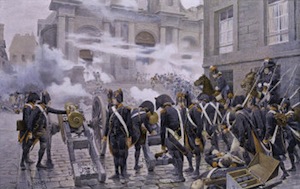In the course of winning a war, there are many important moments. One of them may have been captured in todays front page story in the Wall Street Journal. Titled Radical Iraq Cleric in Retreat, the piece opens this way:
 Anti-American cleric Muqtada al-Sadr long a thorn in the side of the U.S. military and Iraqi government intends to disarm his once-dominant Mahdi Army militia and remake it as a social-services organization.
The story goes on to say this:
The transformation would represent a significant turnabout for a group that, as recently as earlier this year, was seen as one of the most destabilizing anti-American forces in Iraq. For much of the past several years, the Mahdi Army, headed by Mr. Sadr, a Shiite cleric, controlled sizable chunks of Baghdad and other cities. Its brand of pro-Shiite activism had the side effect of pitting Iraqis against each other, helping to stir worries of civil war.
Recently, however, the group has been hit by a largely successful Iraqi military crackdown against militia members operating as criminal gangs. At the same time, Mr. Sadrs popular support is dwindling: Residents who once viewed the Mahdi Army as champions of the poor became alienated by what they saw as its thuggish behavior.
A new brochure, obtained by The Wall Street Journal and confirmed by Mr. Sadrs chief spokesman, Sheik Salah al-Obeidi, states that the Mahdi Army will now be guided by Shiite spirituality instead of anti-American militancy. The group will focus on education, religion and social justice, according to the brochure, which is aimed at Mr. Sadrs followers. The brochure also states that it is not allowed to use arms at all.
Posters have been put up in some areas of Baghdad saying a new direction for the Mahdi Army will be announced at this Fridays prayers.
A U.S. military spokesman rightly reacted by saying that while the military welcomed the news, the proof is always in the actions and not just the words, so well take a wait-and-see approach.
The reason for al Sadrs newfound interest in social service organizing is clear enough: the Mahdi Armys popular support is declining. Like AQI, the Mahdi Army has absorbed devastating military blows. The militia is now in disarray and Basra, long a stronghold for Sadr, is now under control of the Iraq army. According to the Journal, mortar attacks have fallen by close to 90 percent and the number of bodies that turn up in the citys morgue each day has declined from 30 earlier this year to one or two today.
The Journal story follows on a July 27 story in the New York Times, in which
[t]he militia that was once the biggest defender of poor Shiites in Iraq, the Mahdi Army, has been profoundly weakened in a number of neighborhoods across Baghdad, in an important, if tentative, milestone for stability in Iraq.
It is a remarkable change from years past, when the militia, led by the anti-American cleric Moktada al-Sadr, controlled a broad swath of Baghdad, including local governments and police forces. But its use of extortion and violence began alienating much of the Shiite population to the point that many quietly supported American military sweeps against the group.
Prime Minister Nuri Kamal al-Maliki struck another blow this spring, when he led a military operation against it in Baghdad and in several southern cities.
The shift, if it holds, would solidify a transfer of power from Mr. Sadr, who had lorded his once broad political support over the government, to Mr. Maliki, who is increasingly seen as a true national leader.
According to the Times,
[t]he change is showing up in the lives of ordinary people. The price of cooking gas is less than a fifth of what it was when the militia controlled local gas stations, and kerosene for heating has also become much less expensive. In interviews, 17 Iraqis, including municipal officials, gas station workers and residents, described a pattern in which the militias control over the local economy and public services had ebbed. Merchants say they no longer have to pay protection money to militiamen. In some cases, employees with allegiances to the militia have been fired or transferred. Despite the militias weakened state, none of the Iraqis interviewed agreed to have their full names published for fear of retribution.
In a further sign of weakness, Shiite tribes in several neighborhoods are asking for compensation from militia members families for past wrongs.
. Now neighborhoods are breathing more freely. A hairdresser in Ameen, a militia-controlled neighborhood in southeast Baghdad, said her clients no longer had to cover their faces when they left her house wearing makeup. Minibuses ferrying commuters in Sadr City are no longer required to play religious songs, said Abu Amjad, the civil servant, and now play songs about love, some even sung by women.
They lost everything, said the Sadr City government employee. The Sadr movement has no power now. There is no militia control.
This being Iraq, one wants to be cautious in drawing premature conclusions. The Mahdi Army, like AQI, is dangerous and capable of lethal acts. Iraq remains a fragile nation, having endured decades of unimaginable oppression followed by several years of chaos, fear, and a low-grade civil war. The extraordinary gains of the last year can still be undone if we jettison the strategy that has gotten us to this point.
On the other hand, it would be foolish not to appreciate, and to take sober satisfaction in, the magnitude of this development. Not long ago, Muqtada al-Sadr was one of the most powerful anti-American figures in Iraq and a tremendously destabilizing force. There were justifiable fears that he and his Mahdi Army would rip Iraq apart, prevent freedom from taking root, and hand Iran an enormous gift. The fact that Sadr appears to want to disarm his once-dominant militia is therefore a stunning and heartening turn of events. And it is further evidenceif any is needed at this pointof the wisdom of the surge and the achievements of the United States military, led by the incomparable David Petraeus. (Remind me again why Senator Obama insists, even in hindsight, he would still oppose the surge.)
What we are witnessing unfold in Iraq will one day be written about in history books, and not just military history books. To have taken a situation critics said was a mistake of historic proportionsthe worst foreign policy debacle since the founding of the Republicand to transform it into a victory, which is what is well under way, is among the more dramatic and important moments in American history. These have been exhausting years for our nation, ones during which tremendous errors in judgment were made. But they have been memorable and proud ones as well. And now, we can say with increasing confidence, they have been successful ones.
|
 ...hereditary Iraqi holy man and leader of a political movement in Iraq. He had his hereditary rival al-Khoei assassinated shortly after the holy rival's appearance out of exile in 2003. Formerly an Iranian catspaw, lately he's gagged over some of their more outlandish antics, then went back to catspawry...
...hereditary Iraqi holy man and leader of a political movement in Iraq. He had his hereditary rival al-Khoei assassinated shortly after the holy rival's appearance out of exile in 2003. Formerly an Iranian catspaw, lately he's gagged over some of their more outlandish antics, then went back to catspawry...
 [Dawn] Iraq’s anti-regime protesters gathered in the capital and south on Saturday, grieving but defiant after 17 were killed in an attack demonstrators described as "slaughter".
[Dawn] Iraq’s anti-regime protesters gathered in the capital and south on Saturday, grieving but defiant after 17 were killed in an attack demonstrators described as "slaughter". Moqtada
Moqtada  BAGHDADShiite cleric Muqtada al-Sadr ordered most of his militiamen to disarm but said Friday he will maintain elite fighting units to resist the Americans if a timetable for the withdrawal of U.S. troops is not established.
BAGHDADShiite cleric Muqtada al-Sadr ordered most of his militiamen to disarm but said Friday he will maintain elite fighting units to resist the Americans if a timetable for the withdrawal of U.S. troops is not established.  Shiite cleric Muqtada al-Sadr will call on his fighters to maintain a cease-fire against American troops but may lift the order if a planned Iraq-U.S. security agreement lacks a timetable for the withdrawal of American forces, a spokesman said Thursday.
Shiite cleric Muqtada al-Sadr will call on his fighters to maintain a cease-fire against American troops but may lift the order if a planned Iraq-U.S. security agreement lacks a timetable for the withdrawal of American forces, a spokesman said Thursday.
 "No doubt we are facing pressures," Sheik
"No doubt we are facing pressures," Sheik  In many places around Baghdad, the former swagger of al-Sadr's followers has given way to worries about trying to hold the movement together.
In many places around Baghdad, the former swagger of al-Sadr's followers has given way to worries about trying to hold the movement together.  AMARA, Iraq - Iraqi forces backed by US troops have poured into the southern Shia stronghold of Amara in a fresh offensive to drive militiamen out of the violence-wracked city, security officials said on Saturday. Large numbers of heavily armed soldiers have taken up positions in and around the city ahead of an operation that local police said would target 'outlaws'.
AMARA, Iraq - Iraqi forces backed by US troops have poured into the southern Shia stronghold of Amara in a fresh offensive to drive militiamen out of the violence-wracked city, security officials said on Saturday. Large numbers of heavily armed soldiers have taken up positions in and around the city ahead of an operation that local police said would target 'outlaws'.